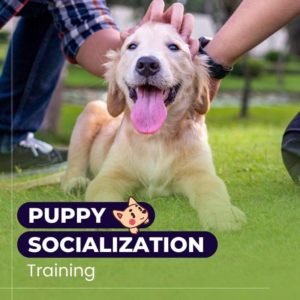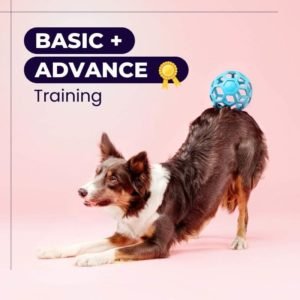Are you planning to get yourself a dog or have you already adopted a puppy?
In case you are planning for a pup or already bought home a cute little furball, then it’s time you know what to do next. Handling a puppy is exactly the same as being a parent to a newborn baby.
It’s exhilarating, it’s tiring, and it is definitely a never-ending learning experience worth a lifetime of memories. Puppies need a lot of tender loving and caring besides the usual feeding, and napping schedule to grow into a healthy dog.
In case you are adopting a puppy rather than having one of your own dogs deliver a litter, the pups are generally a few weeks old and can move around to a certain extent by themselves.
However since they are separated from their mother on being adopted in most cases, they can show signs of anxiety and fear, which can only be resolved by giving enough care, attention, and love. That is the reason why educating yourself well beforehand about how to take care of puppies is important.
The Initial Welcome Party

Preparation for the incoming guest is the first priority. A baby just cannot live anywhere or feed on anything. A puppy is exactly the same. Everything needs to be prepared to make the puppy feel comfortable, warm, and secured. The basic concept of puppy care tips begins with the right set of basic necessities.
- The cocoon – A nice cozy bed is the first priority. It should be warm enough to maintain the optimal body temperature of the puppy and comfortable and secure enough to allow the puppy to roll around freely. Warm quilts or even an electric blanket are a must if you live in a colder area.
- Toys – Babies and pups being alike, they love their toys. From playing with them to chewing them non stop, toys are their instant favorite thing. And since teething is on the verge of beginning, chewing anything and everything becomes their favorite hobby other than feeding, sleeping, and playing.
- The collar and the Leash – Dog collar is the next essential. It’s similar to getting our identity card or social security number. A pretty collar with an equally nice leash is a must, especially when you want to take your puppy out for an introduction with the world
- A vet registration – The first thing to do post adopting a dog or a puppy, is to visit the nearest pet and have it officially registered. Once the registration is done then it is time for the first health screening of the puppy to detect any and every anomalies and issue if any.
The Feeding of the Puppy

Remember the first and most important rule of adopting a puppy…
Pups eat and eat and eat. It’s a lot of food…
The quantity of food these tiny cute bundles consume is perhaps more than what you can imagine. So the first time around you are shopping for puppy food, it’s best to get at least 3 times more the quantity you decided upon.
You don’t want an empty container in between feeding schedules, especially when the puppy is hungry. The diet and the food specification should always be based on the vet’s prescription. It is best to avoid experimenting with puppy food at such a tender age.
You probably have a few specific questions in your mind as to what to feed, when to feed, and why to feed so much. So let’s answer each query as best as possible.
1. What to feed?
Just like any human babies, puppies also cannot digest normal adult food. Specialized custom made puppy food is available for every specific age group. Additional supplements can be added based on the instructions of the vet.
In case your puppy is from a large breed, it should be specifically fed Puppy food for large dog breeds only. No other milk except the mother’s milk or specially formulated puppy milk should be given to a puppy until it is at least 4 months old. Any other form of milk can cause diarrhea in a puppy.
2. When to feed?
Puppies are constantly hungry and need to eat every few hrs, unlike adult dogs.
- For the first 2 to 3 weeks, feeding at an interval of every 2 hrs is crucial. Once the puppy is at least a month old, softened and wet kibbles can be fed every 4 hrs.
- The feeding should gradually be decreased to 4 meals a day at a gap of 6 hrs until the puppy is 12 weeks to 24 weeks.
- From 6 months of age to 12 months of age 3 meals a day is perfectly fine.
3. Why feed so many times?
Puppies burn calories faster than adult dogs as they are at a constant motion of development. The bones, muscles, and organs develop very rapidly during puppyhood. So they need constant and sufficient nutrient supply to assist in the growth process.
4. What should you never feed your puppy?
This is a very important question that we often forget about. Puppies have a very sensitive and still incomplete digestive system. So, they generally cannot process the majority of normal food.
Specific food like fruits, nuts, yeast products, chocolates, dairy products, salt, sugar, caffeine, fried food, etc should be kept away from them.
5. Stimulated Burping and Elimination
These two stimulated functions are important during the first 4 to 8 weeks of age. Burping ensures the trapped air in the digestive tract is released while Elimination helps in defecation of the digested waste.
Learning about the art of body waste disposal

Since puppies eat a lot, they definitely do need to dispose of the same amount of waste as well. So, when you bring home a newborn puppy you have to be prepared beforehand to handle the massacre that is bound to begin within hours of the arrival.
After the initial few weeks of stimulated Elimination, things are bound to get challenging.
Post the Stimulated elimination phase when the puppies begin to relieve themselves, ensure to keep the surrounding in a hygienic and dry condition to avoid any infections. Line up the area with absorbing pads and towels and clean them up well every time.
After the puppies are 3 months old, you can either potty train them yourself or take them to a vet coach. Once the puppies are trained, there is seldom any issue with littering at home unless urgent.
The importance of deworming and immunization

As mentioned above, health checkup immediately post-adoption helps the parents know the puppy better. Considering the fact that puppies are generally more prone to parasitic infections and health issues due to lower immunity levels there are two basic essential steps a new parent needs to know of.
- Deworming
Deworming the main priority to ensure the baby is safe from parasitic health issues. Heartworm, hookworm are just a few dangerous and life-threatening parasite puppies can easily acquire. Post the first initial screening and deworming, the puppies should be checked for worms every two weeks until they are at least 3 months old. Post the age of 3 months, getting checked once every 8 to 12 weeks until the puppy is 18 months old, is sufficient alert for any worm invasion.
- Vaccination
“The 7 in 1 vaccine“
The first dosage of the 7 in 1 vaccine should be injected within 4 weeks of birth. This is followed by a booster dose after 3 weeks and 2nd booster after 1 year. The 7 in 1 vaccine also known as the DHPP vaccine includes protection against Canine Distemper, Hepatitis, Corona Viral Enteritis, Parainfluenza, Parvovirus, and Leptospirosis.
“Rabies Vaccine“
The first dose of the Rabies vaccine is injected at 4 to 5 weeks of age. The first booster dose is given 1 year later followed by a booster every 3 years.
“Bordetella“
First dose at 3 months followed by 1 booster dose after 1 year.
“Lyme Disease and Giardia“
Both these vaccines can be given together at the same time. The first dose is given at 3 months of age followed by 1st booster after 3 weeks and 2nd booster after 1 year.
Pets, especially puppies, can show a slight rise in body temperature and a few mood swings for a day or two after the puppy vaccine schedule or deworming schedule. There is nothing to worry about. It is just the processing of the internal immune system.
In case you do not want the future generations of your puppy arriving home accidentally, getting your dog neutered as early as 6 to 8 months is also a good decision.
Teaching the Puppy About the Outside World

Puppy care begins with nurturing and parenting the puppy the right way. Obedience training and proper social etiquettes are very important lessons every puppy should begin learning about as early as possible. These training and learnings help in shaping the nature and mannerism of the puppy to grow into a well rounded happy dog in the future.
Obedience training is important if you really want your dog to be calm and sociable amidst many people or animals. Alongside social interaction, command training is also very important. Positive reinforcement with treats and cuddles or kisses helps them learn these commands much faster.
Puppies are very well tuned to their owner’s body language and mannerisms from the very beginning. To ensure that your puppy grows into a fine and happy adult dog, it is best to use your instincts in addition to the traditional guidelines and norms.
There are no restrictions or compulsions to do things strictly as specified in the guidelines. What matters, in the end, is that your puppy is healthy, happy, and well-loved.





